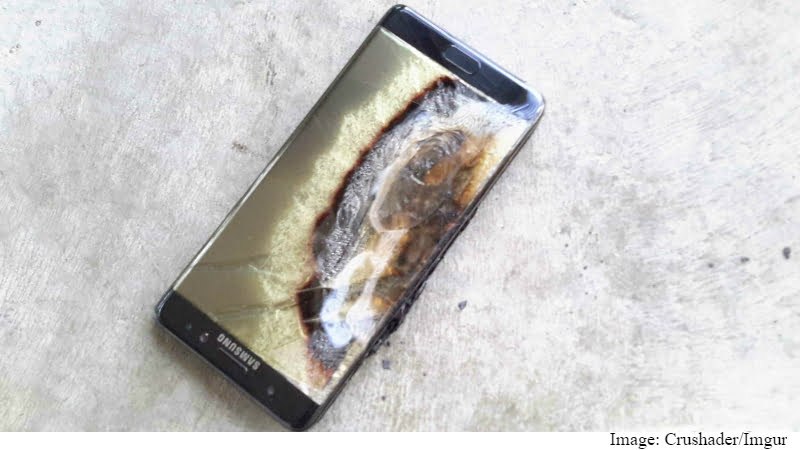
Samsung Electronics Co. blamed a minor battery manufacturing flaw for prompting a global recall of its Galaxy Note 7 smartphones and is seeking more time to investigate the cause behind its deepest crisis in years.
The South Korean company outlined the preliminary findings in a report to the country’s technology standards agency that hasn’t previously been released. Initial conclusions indicate an error in production that placed pressure on plates contained within battery cells. That in turn brought negative and positive poles into contact, triggering excessive heat. Samsung however stressed that it needed to carry out a more thorough analysis to determine “the exact cause” of battery damage.
While executives have referred publicly to manufacturing slip-ups, Samsung’s report went into more detail about the potential flaws in battery design. The company has scrambled to contain the fallout after 35 cases emerged of the Galaxy Note 7 overheating or combusting, with 17 of those reported in its home market. It decided on a complete recall of its plus-sized marquee smartphone even though it meant ceding its head-start over Apple’s latest iPhone.
In its report to the Korea Agency for Technology and Standards, the company emphasized it was pulling out all the stops.
“Even before we have the final result of the investigation, we plan to establish and carry out the best ways to take care of our customers,” the company said in its September 2 report to the agency, a regulatory body that sets policies as part of the Ministry of Trade, Industry and Energy. “We are currently investigating the battery issue in cooperation with battery manufacturers.”
Samsung SDI Co. was the main battery supplier for the Galaxy Note 7, according to a person with knowledge of the matter. Analysts had contended that the affiliate made most of the faulty batteries. The shares have fallen almost 10 percent since September 2.
The Galaxy Note 7 had been one of Samsung’s best-reviewed phones before the company pulled the plug, hurting a stock that only just hit a record in August. Samsung lost $22 billion (roughly Rs. 1,47,207 crores) in market value over two days as regulators, airlines and the company itself warned against the use of the devices. They bounced back Tuesday, closing 4.2 percent higher in Seoul.
The company has said about 2.5 million phones shipped before the recall to consumers and carriers. Galaxy Note 7s with new batteries are due to become available only after September 19. An official at Korean carrier KT Corp. said the number of customers that had gotten refunds on their Galaxy Note 7s was relatively small so far, without elaborating.
Investors are still trying to assess the longer-term damage to a brand Samsung has spent billions of dollars burnishing over the years, as it sought to keep Apple and hard-charging Chinese rivals at bay. Though the mis-step and recall is likely to cost the Korean company upwards of $1 billion, its decisive action may help soften the blow to its reputation. NH Investment & Securities analysts Peter Lee and Justin Choi compared the situation to Johnson & Johnson’s swift recall of Tylenol in the 1980s after a tampering incident resulted in a customer’s death.
That “eventually led to greater end-user faith in Johnson & Johnson’s products,” they wrote. Samsung’s “rapid and responsible reaction to the problem will boost its trust amongst end-users over the mid- to long haul.”










